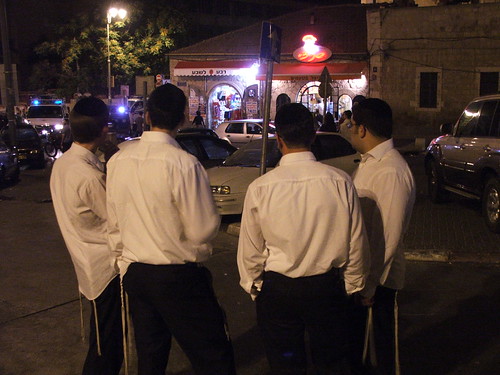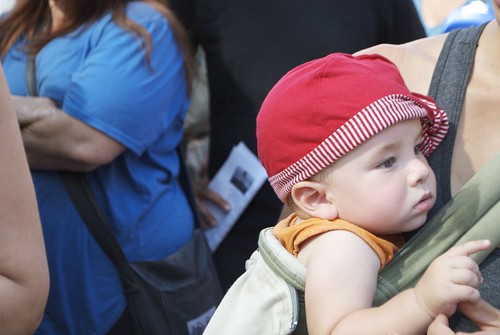August 29, 2011 (Section 1) (see also Section 2)
If you are reading in email or RSS feed, please click here to read ONLINE
Editor – Joel Katz
Religion and State in Israel is not affiliated with any organization or movement
By Rabbi Shlomo Riskin Opinion www.thejewishweek.com August 23, 2011
Rabbi Shlomo Riskin is chancellor of Ohr Torah Stone and chief rabbi of Efrat.
As a result of Israel’s coalition democracy, the religious high court of the Chief Rabbinate in Israel has been “taken over” by haredi religious judges.
These judges are generally not “user-friendly” to would-be converts and many of them are strict constructionalists regarding the criterion of “acceptance of the commandments.” As a result, only a paltry number of these Israeli citizens have succeeded in converting over the last five years.
...David Rotem’s conversion bill could ameliorate a tragic situation for the 350,000 Israelis from the FSU, without worsening the situation for diaspora Jewry. I do not believe the objection of diaspora Jewry is fair to those Israeli citizens whose situation will only be helped by the Rotem Bill.
Rabbi Riskin, conversion and the real facts
By Rabbi Andrew Sacks Opinion www.jpost.com August 28, 2011
Rabbi Sacks is the Director of the Masorti Rabbinical Assembly in Israel
While Rabbi Riskin's words are often interesting, they too often oversimplify realities. This holds true in his recent piece "A Blessing and a Curse."
...Rav Riskin, rightly, disparages the Zealously Orthodox Rabbinate for its obfuscations. But he also sees no place for the non-Orthodox rabbis. Those to his right are too strict and those to his left lack authority. That leaves but one way - the Riskin way.
...Why Rabbi Riskin has chosen this time to, albeit in nice language, to disparage the motives the Jewish world's largest Diaspora community is beyond me.
But at least, in the name of Yosher, he should get the facts straight.
Israel at the crossroads: Halacha or Zionism?
By David Turner Opinion www.jpost.com August 26, 2011
David Turner was the first director, Justice for the Pollards; created JUDAC, Jews United to Defend the Auschwitz Cemetery, 1988; past JNF Regional Director.
...Which brings us back to the “conversion law” and its significance as an issue of Zionism: Israeli secular parties are voluntary hostage to Orthodoxy for coalition creation.
And the reason is clearly that it is politically cheaper to buy religious support on the backs of our Diaspora than to compromise ideological “principles” with secular parties ideologically hardly distinguishable from themselves.
And so “Jewish identity according to Halacha” becomes an internal matter for the state without regard to its impact on our nation beyond.
I Have A Dream for the Future of Spiritual Life in Israel
By Rabbi Dr. Nathan Lopes Cardozo www.jewishideas.org August 26, 2011
Rabbi Dr. Nathan Lopes Cardozo is Dean of the David Cardozo Academy in Jerusalem.
I look forward to the moment when the Chief Rabbinate will consist of men who encourage a genuine dialogue with the secular population; when the Chief Rabbinate will respond to the people’s demands regarding Judaism’s need to produce major Jewish thinkers and highly inspiring personalities.
A time when yeshivoth will cease to be institutions of mass production in which vital issues of faith are shunned, and when running for refuge to trivial substitutes will once and for all be taboo.
MK: Hareidim Won't Accept Trachtenberg Plans
By David Lev www.israelnationalnews.com August 23, 2011
The Trachtenberg committee has long-term plans for the economy, but Hareidim, who feel they are unrepresented on the panel, may reject them.
“I want to say that we Hareidim have no faith in this committee. We will not accept its plans, and we will do everything to ensure that they are not accepted by other communities,” MK Yisrael Eichler (UTJ) added.
What does the Torah say about social justice?
By Rabbi Barry Leff Opinion www.jpost.com August 26, 2011
The writer is a business executive and rabbi. He serves as chairman of the Board of Directors of Rabbis for Human Rights. Opinions expressed here are his own.
Would the rabbis of the Talmud be out on the streets – and in the tents – with the protesters? Or would they be defending the government and the status quo? I believe they would be out in the streets and parks with the demonstrators.
The largely secular protesters may not know it, but they have Torah on their side.
Policy wonks and public present ideas to Trajtenberg committee
By Ilan Lior and Asaf Shtull-Trauring www.haaretz.com August 24, 2011
Dov Lautman, a former president of the Manufacturers Association, told the panel:
[Schools] that don't teach the core curriculum should not receive state funding at all, he said: "Twenty-five percent of Israeli 18-year-olds haven't studied English, math and science."
Salon nation: Israel’s struggle for renewal
By David Suissa Opinion www.jewishjournal.com August 24, 2011
This is what I think Israel will need to advance the struggle for a social Zionist renewal — a tough leader who has the courage to address the totality of the country’s problems; someone who is unafraid to say and do difficult things.
...A leader unafraid to tell the Charedi sector: “Your lifestyle of learning in yeshivot and not contributing to our economy and defense is not sustainable. It is dishonoring your religion and isolating you from the rest of Israeli society. Working for a living is a Torah value. We will gradually wean you from your dependence and give you incentives to enter the work force.”
A leader unafraid to tell the Chief Rabbinate: “You cannot control people’s lives in the name of religion. Coercion turns people off from the very religion you promote. We will introduce legislation so that you will abide by the rulings of centrist, bridge-building commissions.”
The Torah’s take on social justice
By Jonah Mandel www.jpost.com August 26, 2011
According to the Keter Institute for Economy According to Torah, “economically speaking, Judaism is closer to capitalism than socialism, in that it doesn’t tend to get involved in the free market, while socially, the Torah is closer to socialism, in emphasizing the responsibility for society’s weaker members,” the document states in its introduction.
The Keter Institute has been conducting research on Torah and economics for 17 years, on issues such as conducting contracts according to Jewish law, fraud, interest, and keeping Shabbat in a modern economy.
The institute – which includes rabbis, academics and businessmen who meet on a regular basis – also publishes books on such topics, and the eighth title – about to come out – deals with insurance in the light of Halacha.
A Marathon Testing Strength, Wisdom
By Rabbi Donniel Hartman Opinion www.ynetnews.com August 22, 2011
Rabbi Dr. Donniel Hartman is president of the Shalom Hartman Institute in Jerusalem, Israel
To be a Jew is to dream and to aspire to excellence, to transcend the limits of realpolitik and the struggles of the everyday and to build lives of value and meaning.
In the life of an individual, and even more so in that of a society, the challenge is both to determine and set a path of value and to find the strength of character to persevere.
By Greer Fay Cashman www.jpost.com August 19, 2011
...Rabbi Yehoshua Engelman, an Anglo Israeli who was the rabbi of Yakar in the UK for several years and has been the spiritual mentor of Yakar in Tel Aviv since its inception, has done more than just talk.
...Because he is also a talented singer and guitarist, Engelman has attracted a large following of young people, who like to sing along with him and gravitate in droves to his orange tent on Nordau Boulevard on Friday afternoons for his Kabbalat Shabbat service.
He is also a member of Rabbis for Human Rights, who believes that the most positive example of solidarity is to be an active part of a movement, and not just a sympathetic onlooker.
Russian-Israelis protest against marriage restrictions
By Yolande Knell www.bbc.co.uk August 26, 2011
Friends and family watched as they exchanged vows and rings under a canopy in their quirky designer outfits.
Then more than 1,000 guests attended an open-air festival in Tel Aviv, with street performers and musicians, partying long into the night.
The couple's only regret is that their marriage is not legally recognised in Israel.
In fact, it was organised by activist groups as part of a colourful protest against religious restrictions on who can marry.
See also: Public marriage protests the Orthodox rabbinical monopoly
Did Rabbi Soloveitchik Make a Mistake?
http://booksnthoughts.com August 23, 2011
- Review: Rabbi David Hartman, The God Who Hates Lies: Confronting and Rethinking Jewish Tradition, Jewish Lights Publishing
Hartman points out that the [agunah] problem has remained unresolved because even in modern times, “the Orthodox Jewish community, broadly speaking, has coalesced around a conviction that change per se is destructive to the halakhic (legal) system, which must be preserved in the greatest extent possible” even when “moral intuition, logical argument, or observed realities serve as valid bases for critiquing inherited halakhah.”
See also: There is a Need for Change
When divorce refused, Haredi society acts
AP www.ynetnews.com August 28, 2011
Yisrael Briskman's wife in Israel wanted a divorce, and a rabbinical court decided she should be granted one.
But Briskman refused and fled to the United States, where the FBI says an Orthodox Jewish rabbi and his wife lured him to their New Jersey home, kidnapped him and said they'd bury him alive in the Pocono Mountains if he didn't relent.
...The situation in the United States and the modern Jewish Diaspora differs from that in Israel and the long-ago Orthodox communities of Eastern Europe because of the issue of jurisdiction.
Israel's religious courts are official legal institutions, and can impose sanctions on recalcitrant spouses, ranging from driver's license suspension to imprisonment.
VIDEO: Cross purposes within Jewish Agency force reshuffle
By Deborah Danan www.jpost.com August 18, 2011
Rettig Gur claims that the primary goal of the Agency’s new strategy is in determining what motivates people to make aliya – particularly for those who have comfortable lifestyles in the Diaspora.
The Agency further maintains that the reason that people choose to make aliya is the same one that drives people to undertake leadership roles within their Jewish community. This provides another insight into the Agency’s choice to combine its departments.
PHOTO Gallery: Hundreds of American Jews Immigrate to Israel Despite Tensions
By Judy Lash Balint www.demotix.com August 16, 2011
More than 300 American Jews emigrate to Israel and arrived in Tel Aviv on a chartered flight.
Taglit celebrates Israel-Diaspora ties
By Sammy Hudes www.ynetnews.com August 22, 2011
“I think that we all discovered with the years that Birthright Israel actually answers a need, both among young Diaspora Jews and among Israelis to connect.
I’m sure we will meet in ten years, in 20 years, and in 30 years until the project will come to a point where every Jewish youngster will have a chance to visit Israel from here."
With more than 10,000 millionaires, why is Israel still a charity case?
By Joel Braunold Opinion www.haaretz.com August 24, 2011
Joel Braunold is a Bnei Akiva alumnus and a former staff member of OneVoice Europe who is currently studying at the Harvard Kennedy School of Government.
….the current relationship is unhealthy for both Israel and Diaspora communities.
If, as the Hartmann Institute has intimated, a new relationship between Israel and the Diaspora is to be founded beyond that of crisis, then foreign vs. local giving needs to be part of this conversation.
An Israel that is a member of the OECD should no longer be a charity case. I want to give to Israel because I need to, not because it needs me to.
Young Mexican wins 'Jewish Eurovision'
By Eitan Glickman www.ynetnews.com August 27, 2011
Facing an audience of 3,000 people, the 12 finalists of the 2011 Hallelujah song contest took to the stage one by one Thursday evening. They came from Jewish communities in countries all around the world, including Turkey, Russia, Costa Rica and the United States.
VIDEO: Adam Kleinberg Winner Hallelujah 2011
Who will be Israel’s next "Jewish Idol"?
By Elka Looks www.haaretz.com August 22, 2011
“We think that Hebrew is the only thing that brings all the Jews around the world together,” Eitan Gafni, founder and head of the competition told Haaretz.
“What unites them (the contestants) is that they are Jews,” Gafni added, “they come to Israel, they sing in Hebrew and they learn the meaning of the words that they are singing.”
By Rabbi Marc Rosenstein Opinion http://blogs.rj.org August 23, 2011
This ironic situation is typical of the liberal movements' encounter with secularized Israeli Jewish society, which sees them as simultaneously too religious and not religious enough.
In recent decades, the Reform and Conservative movements' presence here has grown substantially, as has the number of Israelis who have encountered these movements through sojourns abroad.
Still, the mainstream view is that "we may hate the Orthodox, but at least they are authentic."
VIDEO: Anat Hoffman on religious pluralism in Israel
Anat Hoffman is Executive Director, Israel Religious Action Center; Founder, Women of the Wall
The public sphere on Shabbat in Jerusalem
Click here for original post (Hebrew)
http://rachelazaria.blogspot.com August 19, 2011
[Google Translator]
It's time we in religious Zionism notice a dramatic change. We are no longer a small, marginal group, nor are we pushed aside, but we occupy key positions in Israeli society.
Change in our community, the public companion, a partner in leadership, demands that we begin to consider the principles by which we make decisions about the nature of Israeli society and the State of Israel - State of the Jewish people.
By Peggy Cidor www.jpost.com August 26, 2011
Hundreds (according to the organizers) of young, and quite a few less young, answered to the call of Hitorerut representatives on the city council and came to celebrate the end of the week at the Khan Theater on Friday at noon.
That was a secular answer to the haredi threat against secular culture in Jerusalem, in response to the last haredi demonstrations against secular outdoor events, led by young leadership in the city – New Spirit and Hitorerut – who decided to fight back.
Visits to Temple Mount by Haredim on the rise
By Jonah Mandel www.jpost.com August 23, 2011
VIDEO: Rabbi Dov Lior and Haredim Ascend to the Temple Mount
The movement of haredi men ascending to the Temple Mount continues to grow, with yet another small group of ultra-orthodox men recently touring the site, this time under the tutelage of Kiryat Arba’s Chief Rabbi Dov Lior.
The leading haredi authorities for both the Ashkenazi and Sephardi populations – Rabbi Shalom Yosef Elyashiv and Rabbi Ovadia Yosef – have prohibited Jews from visiting the area that used to contain the Temples, and is currently under the authority of the Jordanian Waqf, which maintains the important mosques there.
The Charedi invasion of Temple Mount
By Nathan Jeffay www.thejc.com August 25, 2011
Earlier this month, 200 people took to the streets of the strictly Orthodox neighbourhood of Geulah for a demonstration in favour of ascending. And a new organisation, the Charedi Association for Ascending Temple Mount, intends to start running group visits.
This is not just change, but a rare case of Charedim following religious Zionists on a halachic matter. Perhaps more remarkable is the way that this rethink is filtering down to the Charedi community. This is a grass-roots movement organised by the public and one of its aims was to start pressuring rabbis to reconsider their position.
Progressive Jews to start kibbutz in Israel
www.jta.org August 18, 2011
A dozen members of Habonim Dror, a North American Labor-Zionist youth movement, said they intend to immigrate to Israel and found a kibbutz.
Seven Americans and five Canadians in Habonim Dror (the Builders of Freedom), a movement founded in 1935, will make aliyah in September and live together in a so-called urban kibbutz in Haifa.
Welcoming Shabbat the secular way
By Tzofia Hirschfeld www.ynetnews.com August 26, 2011
Some people express their love for Shabbat by lighting candles, other add a synagogue prayer, a meal and songs. Some love it through dancing, and others – like the Beit Tefilah Israeli organization ("Israeli Prayer House") – love it next to the sea.
Every Friday, hundreds of people gather on a hill at the northern part of the Tel Aviv Port to welcome Shabbat. The ceremony is conducted by Esteban Gottfried, who initiated it together with some friends.
www.jpost.com August 27, 2011
The new CD, A Tel Aviv Prayer, with the music of Beit Tefilah Israeli, conveys the experience of the Kabalat Shabbat Service at the Tel Aviv Port.
It includes original tunes to ancient and modern prayers, as well as prayers composed for Beit Tefilah by Israeli musicians Yoni Rechter and Shlomo Gronich. The lead vocalist of the Beit Tefilah ensemble is Atalya Lavi.
August 29, 2011 (Section 1) (see also Section 2)
Editor – Joel Katz
Religion and State in Israel is not affiliated with any organization or movement.
All rights reserved.





